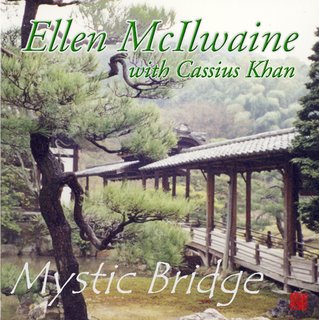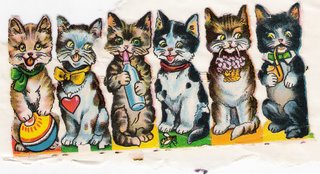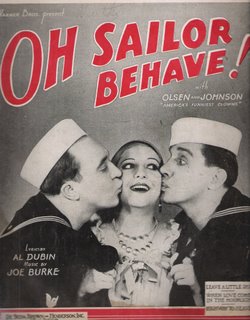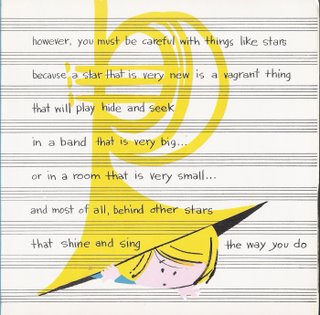Sunday, November 26, 2006
Anita addenda
To partially explain, I will re-post, in part, what I sent to a Yahoo listserve on October 17th regarding the CD that the "forces" in question "produced" for O'Day:
"A friend of mine who is HUGE O'Day fan phoned me night before last. She was not previously aware of the "Indestructible" CD, which she had just picked up at a Tower Records closeout sale. She was in tears. 'How could somebody take advantage of an old lady like that?,' 'What a horrible way to end her recording career,' and so on and so forth."
"Indestructible"---"Unlistenable" is more like it---is one of the worst commercial recordings ever released, not just by O'Day but ANYONE, following on heels of one of the strongest bodies of work in the history of the record biz. This assessment of "Indestructible" is not uniquely mine, but is an opinion held by almost everyone who has listened to this sad sad sad Last Hurrah. The entire unfortunate episode is more than a little remindful of director Max Ophuls' film "Lola Montez." Come see this hip old jazz lady still perform her wondrous vocal wizardry!!!
Think Peace
This post gives me yet another chance to repeat the words of the great perucssionist Max Roach who when asked his opinion of rap replied, "People who voted for defunding of music education programs in public schools are getting what they paid for."
Back to square one, I feel that the Sinatra Vegas set is one of the best packages by him to have appeared in years. Somehow the received critical wisdom re: the later (1980s) 3rd and 4th CDs is that the performances tend to be a bit perfunctory. But to my ears, he sounds spectacular on both, especially the 1987 from the Golden Nugget. Apparently, as an inside joke with himself, he seems to be correcting all of the grammatical errors in the songs, i.e. The Gal Who Got Away, etc. as opposed to "That Got Away," etc. All the way through the set! At 71, here, he's still in great voice and seems to be taking more liberties with the material, whilst still not resorting to all those "Jacks" and added words and syllables that tend to litter the landscape of many of his "live" recordings. And studio sides as well in later years: On one cut from the Duets album I counted 57 added words to the composers' original intent. i.e. "I've got that there world on a big old piece of string sitting smack dab on a rain rain rainbow." Not exactly what he did, but I'm sure you catch my drift. As one fine singer of my acquaintance observed when I told her about this, "I guess he thinks that's hip." My analysis is that after singing the same songs over and over again for fifty years or more he had to do something to sort of slap himself in the face to keep from going on auto-pilot. A small price for us listeners to pay.
Thursday, November 23, 2006
Anita O'Day R.I.P.
 To paraphrase a line in Robert Altman's "Prarie Home Companion," "The death of an old woman is not a tragedy." Nonetheless it's sad the world will never see the likes of Anita O'Day pass its way again. In my opinion, she is the only one of the inarguable greats---Sass, Ella, Frank, Billie, et al---unreduceable, ultimately, to the sum of her parts. With a couple of exceptions, all of O'Day's 17 Norgran-Verve LPS are markedly different in conception from one another. And Anita's singing on each finds her immediately responding to the musical surroundings in a radically different fashion from her other albums. She really didn't scat often, nor play with the melodies all that much. Instead, she was "in the moment," plugged into what the band was doing, and, seemingly, the music of the spheres.
To paraphrase a line in Robert Altman's "Prarie Home Companion," "The death of an old woman is not a tragedy." Nonetheless it's sad the world will never see the likes of Anita O'Day pass its way again. In my opinion, she is the only one of the inarguable greats---Sass, Ella, Frank, Billie, et al---unreduceable, ultimately, to the sum of her parts. With a couple of exceptions, all of O'Day's 17 Norgran-Verve LPS are markedly different in conception from one another. And Anita's singing on each finds her immediately responding to the musical surroundings in a radically different fashion from her other albums. She really didn't scat often, nor play with the melodies all that much. Instead, she was "in the moment," plugged into what the band was doing, and, seemingly, the music of the spheres. My late friend George Eells helped Anita write her memoirs, and while they might have had a few conflicts in the lengthy process, George just loved her. His last interaction with her was years afterward. He had loaned her some money while they were writing the book. Probably a few hundred dollars. And she rang George up out of the blue one day---unbidden---so she could meet him in a bank and pay the money back. Ultimately, as I recall, George was not all that surprised. And probably had even forgotten the debt altogether. That's the way he was.
I, however, always am surprised when listeners tend to regard O'Day, Chris Connor, and June Christy as soundalikes. To my ears, they could not have sounded more UNalike. O'Day sonically resembled herself and herself alone. The twilight of the gods, I tell you, the twilight of the gods.
So sad that she was taken advantage of in her final years by forces who had anything but her best interests at heart. Best, perhaps, to think of her in happier times.
Wednesday, November 22, 2006
Back story L.A.
David doesn't drive---a grateful America thanks him---and so I chauffered him to a few of the interviews, with director Ronald Neame, Barbara Steele, and Jacqueline Bisset, and now that the article has appeared, IT can be told: I have never encountered any three more charming and articulate sorts in all my years here in L.A., The City Where the Future Comes to Die. Pity the city isn't completely stocked to the brim with their U.K. emigree lot. In addition, Steele and Bisset could not have been sexier. And as for dear "Ronnie" Neame, it is genuinely inspiring to meet a nonagenarian who shows so few signs of agedness. I eventually felt so comfortable around him that I "did" my Shelley Winters imitation from "The Poseidan Adventure" ---think overarticulated breast stroke----and he laughed quite heartily . When I asked if he had any serious health issues at this advanced stage of life, the director confessed to having walking problems as of late. But then, when Neame saw David and I out, this man who was a cameraman on Hitchcock's first sound film (!) more-or-less bounded across the room. David used to make me wait out in the car when I drove him to interviews (at least he didn't force me to wear a chauffeur's uniform), but as of late he allows me come in, but only if I promise to be quiet as a mouse. That'll be the day! I "killed" with my imitation of Shelley Winters.
Tuesday, November 21, 2006
The Buzz Begins in Japan for Pinky Winters

Squib in Nippon Keizai Newspaper (the Japanese Wall Street Journal) on November 29 which translates as:
A Treasure of the Jazz Vocal World
"Pinky Winters has gained a lot of attention since the release of two albums from the Sinatra Society of Japan: Summer 2005‘s “Rain Sometimes” and the “live” album “The Shadow of Your Smile” from February of this year, Now they are releasing the World Premiere of “Speak Low,” on December 6th in time for her first visit to and performances in Japan.
She has been performing wonderfully with her inimitable voice at notable clubs in Los Angeles and Santa Monica, attracting many listeners. After years of experience. she is now approaching the peak of her artistry. Her natural style of singing conveys the sense that she is truly enjoying herself. That, in turn, accords listeners a moving experience. Come and partake of this profound singer and discover how great jazz singing can be." translated by JK
Five gigs---two public and three private---a "live" recording date, a filmed concert, a major newspaper article in the big Daily Mainichi, and a Swing Journal interview. All between December 6th and the 16th. This is going to be so much fun, and finally the recognition that jazz singer Pinky Winters has deserved for so long. When I initially visited Japan seven years ago is the time I first became aware that Pinky is not all that obscure in Japan. The initial tip-off was a small shrine (of sorts) devoted to her in one of Tokyo's gigantic HMV records stores. THAT, and a nosebleed-inducing vertigious price on the collectors' market for her first LP, a ten-incher.
I wouldn't even be surprised to see press and photogs at Narita airport when Pinky touches down. "Miss Winters-zu! Over here!" Probably not, but it's fun to think so.
Saturday, November 18, 2006
RUTH BROWN R.I.P
One example of just how far Joe [Louis] would go to get a laugh requires a little background. Since, until fairly recently, there were hardly any hotels below the Mason-Dixon line that catered to other than whites, when black performers toured the South, they were forced to make do with whatever lodgings they could muster up. This was the situation in 1953 when Joe and I were touring our standup comedy act as part of a package called The Big Rhythm and Blues Show. Ninety cities in nearly as many nights! Joe was the headliner, but the others on the bill were fairly big stars in their own right: Ruth Brown; Buddy Johnson and Ella Johnson and a sixteen piece band; comic Dusty Fletcher; singers Wynonie Harris, the Clovers, the Edwards Sisters; and for jazz spice, Lester Young. Naturally, the housing problem proved especially great for a traveling unit as large as "The Big Show" with its two busloads of nearly fifty blacks. Or, I should say it was a problem to everyone in our troupe but me! Since I looked too white to stay in most places that catered to blacks anyhow, I usually stayed in white establishments. Most rooming houses in the South were willing to allow a white manager traveling with an all-black show to stay with his cast, but still things could get messy. Many more times than I care to recall, during the first two decades of my show business career I'd been routed by the local constabulary in the middle of the night and thrown out of my lodgings, bag and baggage. On one occasion I was even arrested. The charge? Being a white man cohabiting with coloreds! And so with "The Big Show," the bus would pull into a town, I'd get off at a white hotel, and the rest of the cast and crew would head off to the black side of town to scuffle.
Not everyone in the company accepted my excuse that I was checking into the white hotels to avoid trouble with the law; and others were annoyed by the fact that many of the places I stayed just happened to be located conveniently near the nice whites-only golf course in town. A few just thought I was being "uppity". But mostly there were no strong, hard feelings and things went smoothly. Except, once in Houston. I got off the bus at the swank Shamrock Hotel, waved goodbye to the others, and after checking in at the desk I went to my room and was just getting comfortable when there was a knock at the door. I got up, opened it, and it was the manager of the hotel.
"I'm sorry, sir, but you can't stay here," he said in this very starchy voice.
"Why, what's the problem? I paid in advance and everything," I said.
"We'll refund your money. I think you'll be happier elsewhere."
I began to catch his "draft"; back then when blacks sensed white prejudice they called it feeling a "draft," and this was a positive hurricane. Knowing that there was no use in bothering to protest, I told him I'd leave, and I packed up to go.
When I reached the lobby, the reason for his attitude was obvious. Actually, three reasons. There stood one of our show's star attractions Ruth Brown, and pulling up the rear were two of the most pathetic little, wide-eyed waifs you ever laid eyes on playing the part of her children. She strode angrily across the lobby, and when she reached me, shook her finger in my face, grabbed me, and as she dragged me toward the hotel entrance, shouted back over her shoulder at the two little "picks": "Come along, children, we've found your daddy."
Needless to say, Joe had put her up to it.
Thursday, November 16, 2006
Wednesday, November 15, 2006
All About Chris Connor, part two
TA-DA!


DustyGroove has a number of recent SSJ Records Japanese imports at prices that don't neccessitate selling off your first-born
Sunday, November 12, 2006
Gotta watch the hyperbolic overkill here, BUT. . ..
No surprise that the standouts were singers Pinky Winters, Bill Henderson and Sue Raney, but a new-to-me young singer-pianist, Bill Cantos, is clearly slated for a long and successful career. Think John Pizzarelli at the piano. . .sorta. Not a clone by any means, but surely as good as Bucky's boy. Also performing a moving version of How Do You Keep the Music Playing was its co-lyricist Alan Bergman.
It was an all Johnny Mandel-program performed, in addition to the above, by such singers as Shelby Flint, Lorraine Feather, Morgan Ames, and vocal group Inner Voices, comprised, in part, of Ames and Flint.
The sextet, led by Mandel, was every bit as stellar as the vocal contingent and included Don Shelton, Mike Melvoin and Chuck Berghofer.
A partial list of the repertoire: Cinnamon and Clove, A Time for Love, Shining Sea (Raney); Emily, You Are There (Tierney Sutton); Close Enough For Love (Sutton and Cantos); I've Been Around, El Cajon (Cantos), Vacation from the Blues, Living Without You (Henderson); Solitary Moon, (Mandel and the Bergman's new) A Waltz From Somewhere (Flint), and Don't Look Back, I Never Told You, Take Me Home (Winters).
Both shows clocked in at a total of just about four hours, and if I weren't so wary of adjectival over-the-topness, damned if wouldn't be tempted to deem the day downright historic.
Natal Day of two nonpareil thrushes
Thursday, November 09, 2006
Wednesday, November 08, 2006
Chris Connor's Birthday
Happy birthday, Chris Connor!
In honor of the occasion, here's a post on this blog from early this year.
Monday, November 06, 2006
Reflections on Betty Be-Bop
With one exception, I saw Betty Carter 'Live" more than any other single performer. At her peak, she could have an audience in the palm of her hand before the first song was concluded. A dynamic, take-no-prisoners, hit-the-ground-running, charismatic artist who could even have won over a crowd of Lennon Sisters fans who might have wondered into one of her club dates by mistake. On the other hand, I once gave a Carter CD to a much-more-conservative, but nonetheless quite fine singer friend of mine. (No names puh-leese.) She had never heard Carter. I called her a couple of days later to ask what she thought of it. My friend said that she'd become so immediately overwrought by the experience of listening to the recording to the point of ejecting the disc and throwing it out of the car window and onto the Jersey freeway on which she was traveling. Oh, well as the liner notes to one of Carter's CDs correctly observe, "One man's jazz singer is another's Robert Goulet."
One time I saw Carter in performance at NY's Town Hall, and when she began singing "Round Midnight," using Bernie Hanighen's set of lyrics to the Monk tune, who should've begun shouting at her from the audience but singer Babs Gonzales. He then proceeded to leap up on the stage to begin singing his own---and much more obscure---lyrics to the bop anthem. Carter just stepped aside with a look on her face that read, "Oh, that Babs!" and let him complete the number. Unlike the heckler at a recent Stresand concert, definitely NOT a plant.
If the gardenia was Billie's signature, Carter's was (at least "live") off-the-shoulder dresses which exposed only one shoulder, always the left. That undulating exposed part of her upper torso was definitely a part of her act.
Avant-garde jazz pianist Cecil Taylor once told me with an absolultely straight face, "I feel so sorry for Betty Carter." "Why?," I bit. "Because her husband's favorite singer is Nancy Wilson." Oh well, as the saying goes, "One man's jazz singer. . .."
Saturday, November 04, 2006
Ellen McIlwaine alert

My longtime friend Ellen McIlwaine has a brand new CD. Here is the info on it. In the near future I will be posting on this blog a long career article about Ellen.
Friday, November 03, 2006
Cruze/Cruise Control

EX-CLU-SIVE: Tom Cruise to Revive Edsel
Cruze Bustamante: "I'm not fat. Vote for me!"
Cruising in Colorado Springs:
"I've never had a gay relationship in Denver." ---Ted Haggard.
As one local wag recently remarked (like, this morning across the breakfast table): "You could drive a truck through that statement."
My own reaction to fundies like Haggard is that they give the ineffable/unknowable a bad name. I wonder if he's entered rehab yet? No changes to his web site so far. If, however, you would like to "arrange an interview" with Haggard, here's the email address: mbritton@newlifechurch.org .
I used to be an announcer on a religious radio station. ("Dr. Chilledair, is there anything you haven't done in your long and colorful career?") And nearly every fundamentalist minister I met there was a closet case. ("Why Reverand Hissom, just What Kind of a boy do you think I am?")
Have you had a good look yet at the the screamer who's replacing Haggard? If he's not a queen, I'll eat my copy of Judy at Carnegie Hall at high noon in the Castro.
Wednesday, November 01, 2006
Dr. Chilledair's Dept. of Amplification
"Gladys Bentley was a man!," Frances Williams insisted to me, when the subject of the ostensibly female, cabaret singer-pianist and court jester to the Harlem Renaissance was raised. I interviewed the late actress-activist Williams, perhaps best-known as "Miss Marie" on the TV series Frank's Place for my 1998 book, Hot from Harlem (republished this year by McFarland Press).
I was reminded of Bentley (1907-1960) and my interview with Frances because today is Gladys' birthday.If anyone should have known about Bentley, it was Williams. She was there at the time."Even when Frances was confronted with Sisters of the Renaissance, a publication containing information to the contrary [the passage on Bentley in 'Harlem' continued] she stuck to her guns: She shot a look that signaled case closed.. ..end of discussion.
Certainly, Bentley gave good cause for Williams to suspect she might be all man: Gladys worked entirely in male drag and sang double-entendre songs and parodies that often as not alluded to and/or celebrated the joys and perils of gay romance. But that was later on; here is Langston Hughes' description, in his The Big Sea, of Bentley in action "before she got famous, acquired an accompanist, specially written material, and conscious vulgarity: Miss Bentley sat, and played a big piano all night long, literally all night without stopping-singing songs like 'The St. James Infirmary': from ten in the evening until dawn, with scarcely a break in between the notes, sliding from one song to another, with a powerful and continuous underbeat of jungle rhythm."
He goes on to describe the ample, ebony, and deeply butch performer as "a perfect piece of African sculpture." Novelist Carl Van Vechten was similarly taken with her (or him); in his Parties, he writes of an unnamed character who is clearly Bentley: "There is a girl up there now you oughta hear. She does her hair so her head looks like a wet seal and when she pounds the piano the dawn comes up like thunder." In her Black Pearls: Blues Queens of the 1920s, Daphne Duval Harrison suggests that it wasn't only Frances Williams who felt that this woman imitating a man might have, in fact, been-shades of Victor Victoria-a man (gay, at that) imitating a lesbian pretending to be man. She describes Bentley as a "tough-talking, singing piano player who some believed to be a male transvestite and others a lesbian."
In Gay New York, George Chauncey recalls Bentley as: "[An entertainer] who performed in a tuxedo and married her lover in a much discussed ceremony."If, in fact, Bentley was a lesbian, she recanted her sapphic ways for good in 1952 in a magazine article entitled "I Am a Woman Again. She then married a sailor in San Diego and spent the remainder of her years writing her (yet to be published) memoirs. If ever there was a subject who cried out for further research it is Bentley who may have singlehandedly engineered the gender-bendingest hoax ever perpetrated on Cafe Society."
AND HERE IS THE IMPORTANT ADDITION. JUST NOW, RECALLING THAT SOMEONE ONCE TOLD ME THAT BENTLEY HAD MADE AN APPEARANCE ON GROUCHO'S "YOU BET YOUR LIFE," I ENTERED BENTLEY'S NAME IN THE SEARCH BAR ON YOUTUBE. AND WHADYA KNOW! THERE SHE WAS. THIS MIGHT WELL BE THE ONLY EXTANT FILM FOOTAGE OF THIS CRUCIAL HARLEM RENAISSANCE PERFORMER. HERE ARE GROUCHO MARX AND THE EQUALLY ONE AND ONLY GLADYS BENTLEY.








